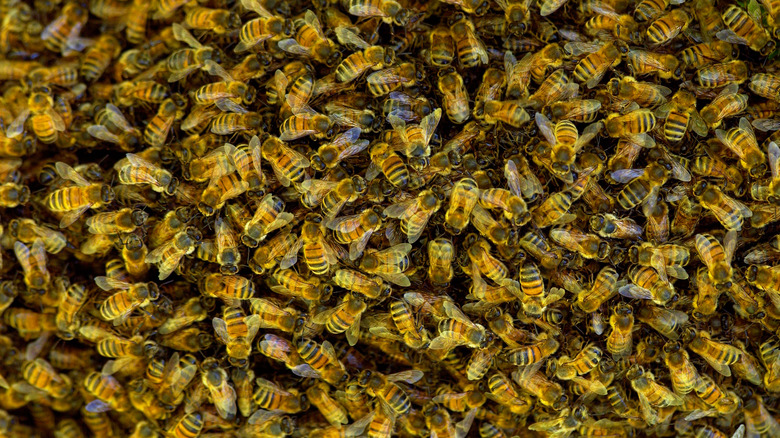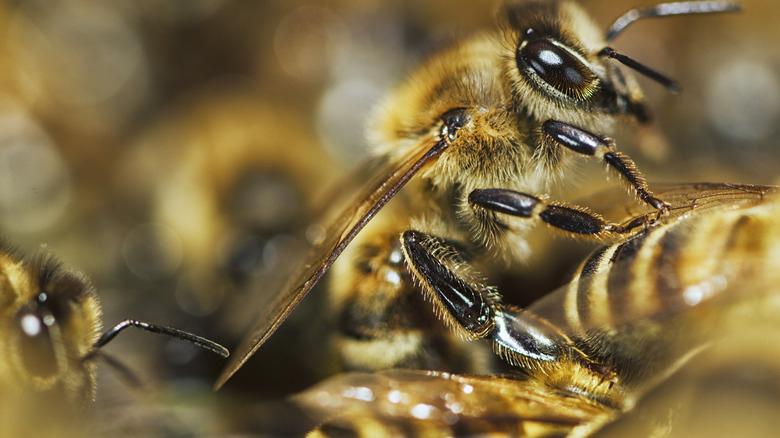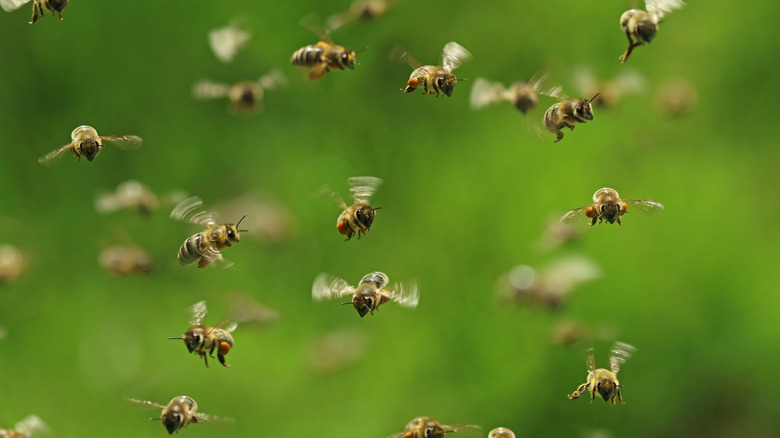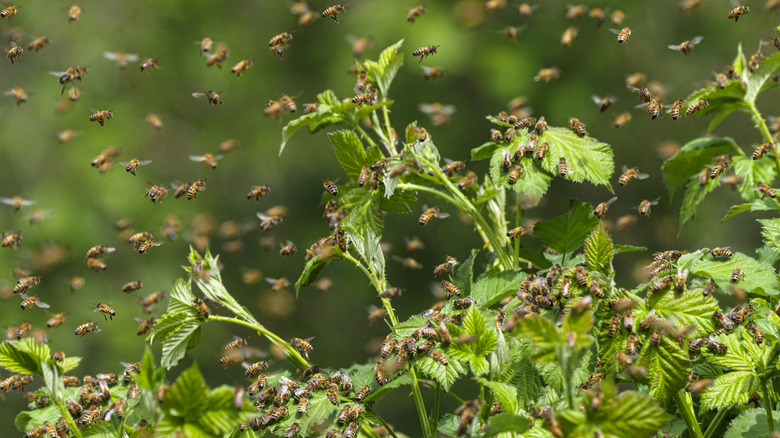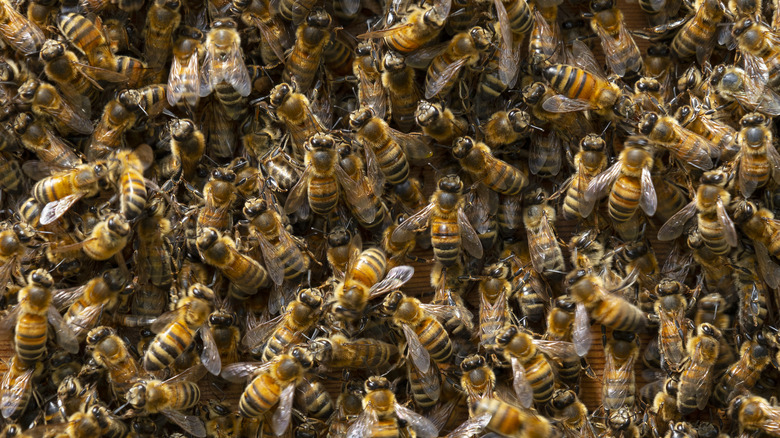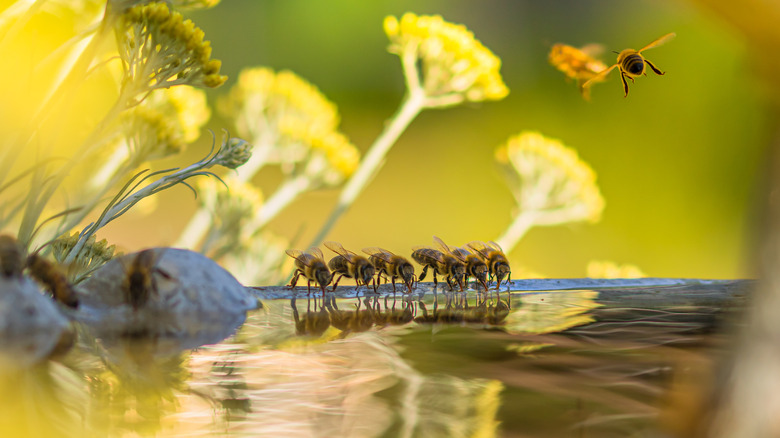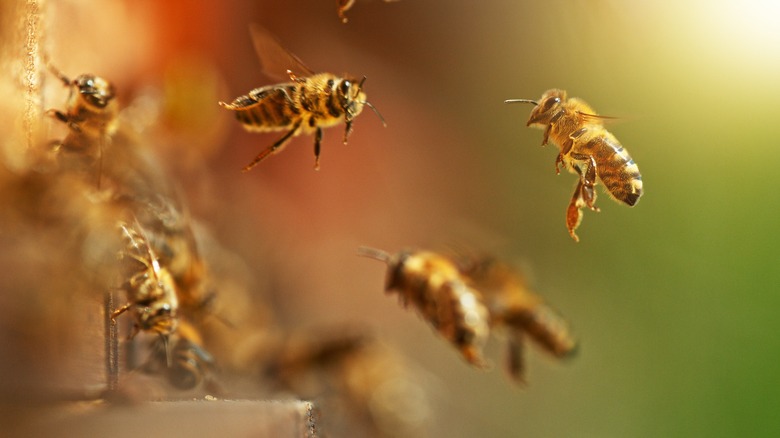What To Do If You're Attacked By Bees
Bees are vital pollinators who keep our ecosystem running, but like anything else, they will defend themselves if threatened. Their stings are painful, but are only dangerous if you have an allergic reaction to them –- however, if they attack in large numbers, bee stings can be deadly.
Sometimes bees swarm. That's not always a bad thing. Usually, when you see a swarm of bees they are just going about their business. They are likely trying to build a new hive and are uninterested in you. In that case, all you have to do is remain calm and leave them alone. If you got too close to their hive, disturbed it by accident, or tried to remove it however, you may be dealing with an aggressive swarm.
If you are near their home, the bees will likely try to scare you away — which might feel like they're attacking. As described by entomologist Carl Olson in a report by Scientific American, honeybees will first bump into a person approaching the hive. If this happens, you should leave the area immediately. If it's too late and you're already caught in an aggressive swarm, here's what to do.
Do: Run away
It might seem obvious, but the single best thing that you can do if you find yourself attacked by a swarm of bees is to run away. As noted by The British Beekeepers Association, bees can fly up to 20 mph, while the average person only runs between 5 and 6 mph. However, as quoted in a report from The Washington Post by ecology professor James Nieh, who studies bee communication and aggression, bees fly slower in a swarm. If you run in a straight line, you might be able to outpace them, or at least get to safety.
While honeybees have been known to follow an accidentally abducted queen for days, most will leave you alone if they realize you are leaving the area and no longer a threat to their hive. Even Africanized Honey Bees, which are known to be more willing to chase intruders, will not usually go farther than a quarter of a mile.
Do: Get inside
When a woman and her two children were attacked by a swarm of bees in Buckeye Valley, Arizona, she was able to save them by throwing them both into their car and slamming the door behind them. As described in a report from The Washington Post, while the woman was stung multiple times and had to go to the hospital, neither child was injured. She did exactly the right thing — getting into a car is an excellent strategy for escaping a swarm of defensive bees.
If you are swarmed, run directly for shelter. That can be a building, a car, or anything else that will give you cover from the attack. Even a tent at your campsite should be enough to keep you safe, as long as it is sealed up enough to prevent many bees from getting in after you. In an emergency, you may have to use blankets or sleeping bags to keep the bees off of you — but you will have to use your discretion to determine if it's better to use these improvised coverings or keep running away from the swarm.
Don't: Panic or scream
Like in any animal encounter, it's very important to stay calm, which can be difficult with your ears full of the buzzing of the swarm and cortisol rushing through your body in response to their stings. If you can keep from panicking, you'll be in a much better position. While running away fast is important, avoiding tripping and falling is too. The last thing you want is to be on the ground, surrounded by bees, with a sprained ankle.
Some experts, including beekeeper Erika Thompson in a report from The Washington Post, advise avoiding screaming or calling out to others if possible, because bees may be agitated by the carbon dioxide that you exhale. Disturbingly, it is also possible to suck bees into your mouth with a forceful inhale, and bees can sting the inside of your mouth and throat, so it is wise to keep your mouth shut while you escape, if possible.
Don't: Swat the bees
Many people's first reaction when a bee bumps into them or lands on them is to swat at it. This is a bad idea in any circumstances because bees are likely to sting when they feel threatened and attacking them gives them every reason to sting you. In a situation where they are already swarming after you, trying to sting you, or maybe already stinging you, you still shouldn't try to swat them.
One reason is that slowing down, even a little bit, to take a swing at a bee is not worth the danger. As described by entomologist Dr. Justin O. Schmidt in an interview with ABC News, when you slow down, you are giving the entire swarm, which could be thousands of bees, time to catch up to you. It's possible that you could swat one bee, but you will not be able to take out literal thousands of insects before the others can sting you. Worse, when a bee dies it gives off an alarm scent which the other bees use to find the place the bee was killed and defend the hive.
Don't: Jump into water or play dead
There are a lot of urban legends about how to escape angry bees, including that the only way to escape the swarm is to drop to the ground and pretend they have already killed you so that they leave you alone. While this strategy might work on grizzly bears it does not work on bees. Bees communicate with each other by pheromones, and the one they leave behind when they sting you alerts the other bees that they should go there and sting the presumed predator in the same place. Whether you are running, lying down, or actually dead, the bees will not know or care. They are responding to the call from the pheromone and will continue to sting.
Another urban legend states that the best way to escape from a swarm of bees is to jump into water. In theory, it makes sense. Bees cannot swim and will be unable to sting you through the water. In practice, however, it's a dangerous plan. Having just been running, it's likely that you will be out of breath, and you will have to come up for air frequently. When you surface, the bees will be able to sting you. They may wait for you at the surface, and if the beehive is close to the water, they may stay in the area for a long time. Rather than keeping you safe from bees, leaping into the water just makes it more likely that you will drown.
Do: Remove stingers and get proper treatment
As soon as you are indoors or no longer being chased by the swarm, you should call for medical help. If you have been stung several times, you will probably need to be given antihistamines and epinephrine. While you're waiting for help to arrive, search your skin for signs of bee stingers. This will help you to reduce the amount of venom coming into your body and might reduce your body's reaction to the stings. It also will reduce the amount of alarm pheromones stuck to your body, which can potentially attract more bees to you.
If you know that you are allergic to bees, it is vital that you use an EpiPen immediately to prevent anaphylaxis. If you are not allergic to bees, don't use an EpiPen. It won't help, and can give you dangerous side effects. Individual bee stings can be treated with antihistamines and anti-itch creams.
